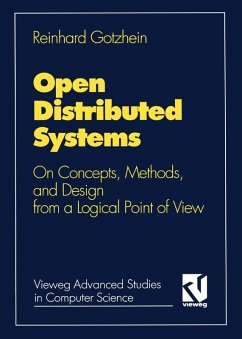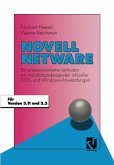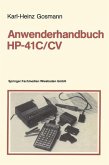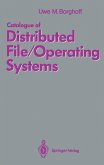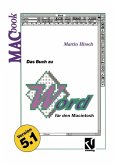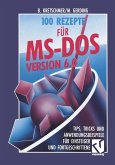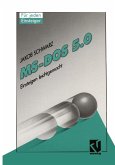Reinhard Gotzhein
Open Distributed Systems (eBook, PDF)
On Concepts, Methods, and Design from a Logical Point of View
-22%11
42,99 €
54,99 €**
42,99 €
inkl. MwSt.
**Preis der gedruckten Ausgabe (Broschiertes Buch)
Sofort per Download lieferbar

21 °P sammeln
-22%11
42,99 €
54,99 €**
42,99 €
inkl. MwSt.
**Preis der gedruckten Ausgabe (Broschiertes Buch)
Sofort per Download lieferbar
Alle Infos zum eBook verschenken

21 °P sammeln
Als Download kaufen

54,99 €****
-22%11
42,99 €
inkl. MwSt.
**Preis der gedruckten Ausgabe (Broschiertes Buch)
Sofort per Download lieferbar

21 °P sammeln
Jetzt verschenken
Alle Infos zum eBook verschenken
54,99 €****
-22%11
42,99 €
inkl. MwSt.
**Preis der gedruckten Ausgabe (Broschiertes Buch)
Sofort per Download lieferbar
Alle Infos zum eBook verschenken

21 °P sammeln
Reinhard Gotzhein
Open Distributed Systems (eBook, PDF)
On Concepts, Methods, and Design from a Logical Point of View
- Format: PDF
- Merkliste
- Auf die Merkliste
- Bewerten Bewerten
- Teilen
- Produkt teilen
- Produkterinnerung
- Produkterinnerung

Bitte loggen Sie sich zunächst in Ihr Kundenkonto ein oder registrieren Sie sich bei
bücher.de, um das eBook-Abo tolino select nutzen zu können.
Hier können Sie sich einloggen
Hier können Sie sich einloggen
Sie sind bereits eingeloggt. Klicken Sie auf 2. tolino select Abo, um fortzufahren.

Bitte loggen Sie sich zunächst in Ihr Kundenkonto ein oder registrieren Sie sich bei bücher.de, um das eBook-Abo tolino select nutzen zu können.
- Geräte: PC
- ohne Kopierschutz
- eBook Hilfe
- Größe: 16.93MB
Andere Kunden interessierten sich auch für
![Novell Netware (eBook, PDF) Novell Netware (eBook, PDF)]() Norbert HeeselNovell Netware (eBook, PDF)42,99 €
Norbert HeeselNovell Netware (eBook, PDF)42,99 €![Arbeitsbuch zum Macintosh (eBook, PDF) Arbeitsbuch zum Macintosh (eBook, PDF)]() Paul SchmitzArbeitsbuch zum Macintosh (eBook, PDF)42,99 €
Paul SchmitzArbeitsbuch zum Macintosh (eBook, PDF)42,99 €![Anwenderhandbuch HP-41 C/CV (eBook, PDF) Anwenderhandbuch HP-41 C/CV (eBook, PDF)]() Karl-Heinz GosmannAnwenderhandbuch HP-41 C/CV (eBook, PDF)33,26 €
Karl-Heinz GosmannAnwenderhandbuch HP-41 C/CV (eBook, PDF)33,26 €![Catalogue of Distributed File/Operating Systems (eBook, PDF) Catalogue of Distributed File/Operating Systems (eBook, PDF)]() Uwe M. BorghoffCatalogue of Distributed File/Operating Systems (eBook, PDF)40,95 €
Uwe M. BorghoffCatalogue of Distributed File/Operating Systems (eBook, PDF)40,95 €![Das Buch zu Word für den Macintosh (eBook, PDF) Das Buch zu Word für den Macintosh (eBook, PDF)]() Martin HirschDas Buch zu Word für den Macintosh (eBook, PDF)33,26 €
Martin HirschDas Buch zu Word für den Macintosh (eBook, PDF)33,26 €![100 Rezepte für MS-DOS 6.0 (eBook, PDF) 100 Rezepte für MS-DOS 6.0 (eBook, PDF)]() Bernd Kretschmer100 Rezepte für MS-DOS 6.0 (eBook, PDF)42,99 €
Bernd Kretschmer100 Rezepte für MS-DOS 6.0 (eBook, PDF)42,99 €![DOS 5.0 (eBook, PDF) DOS 5.0 (eBook, PDF)]() Jakob SchwarzDOS 5.0 (eBook, PDF)42,99 €
Jakob SchwarzDOS 5.0 (eBook, PDF)42,99 €-
-
-
Produktdetails
- Verlag: Vieweg+Teubner Verlag
- Seitenzahl: 230
- Erscheinungstermin: 9. März 2013
- Deutsch
- ISBN-13: 9783322860095
- Artikelnr.: 53195619
Dieser Download kann aus rechtlichen Gründen nur mit Rechnungsadresse in A, B, BG, CY, CZ, D, DK, EW, E, FIN, F, GR, HR, H, IRL, I, LT, L, LR, M, NL, PL, P, R, S, SLO, SK ausgeliefert werden.
Hinweis: Dieser Artikel kann nur an eine deutsche Lieferadresse ausgeliefert werden.
- Herstellerkennzeichnung Die Herstellerinformationen sind derzeit nicht verfügbar.
0 Introduction.- 0.1 Key topics of open distributed systems design.- 0.2 The role of standards.- 0.3 The need for formal descriptions.- 0.4 Distributed systems from the point of view of DAI.- 1 Formal methods in the system design process.- 1.1 A model for the system design process.- 1.2 Requirements for formal description techniques.- 1.3 Synthesis and analysis activities.- 2 Requirement specification of open distributed systems.- 2.1 Basic architectural concepts.- 2.2 System architectures.- 2.3 Refinement and abstraction.- 2.4 The Basic Reference Model of Open Systems Interconnection.- 2.5 Basic concepts of formal description techniques.- 2.6 Some remarks.- 3 The design of a temporal logic for open distributed systems.- 3.1 Some requirements on expressiveness.- 3.2 A survey of temporal logics.- 3.3 A modular temporal logic for open distributed systems.- 4 The interaction point concept.- 4.1 The role of interaction points.- 4.2 A list of possible interaction point properties.- 4.3 Formal specification of interaction point properties.- 4.4 Formal reasoning about interaction points.- 4.5 Interaction point representations in operational FDTs.- 4.6 Conformance between abstraction levels via the interaction point concept.- 5 Communication services.- 5.1 The service concept.- 5.2 Design methodology.- 5.3 Example "modified InRes service".- 5.4 Conclusion.- 6 An epistemic logic for open distributed systems.- 6.1 The role of knowledge.- 6.2 Notions of knowledge.- 6.3 A modular epistemic logic for open distributed systems.- 7 Applying temporal epistemic logics to open distributed systems.- 7.1 Example "mutual exclusion".- 7.2 Example "drink server".- 8 Conclusion.- References.- A.1 Theorems and valid formulas.- A.2 Ordering properties for the service provider.- A.3Abbreviations.- A.4 Notation.
0 Introduction.- 0.1 Key topics of open distributed systems design.- 0.2 The role of standards.- 0.3 The need for formal descriptions.- 0.4 Distributed systems from the point of view of DAI.- 1 Formal methods in the system design process.- 1.1 A model for the system design process.- 1.2 Requirements for formal description techniques.- 1.3 Synthesis and analysis activities.- 2 Requirement specification of open distributed systems.- 2.1 Basic architectural concepts.- 2.2 System architectures.- 2.3 Refinement and abstraction.- 2.4 The Basic Reference Model of Open Systems Interconnection.- 2.5 Basic concepts of formal description techniques.- 2.6 Some remarks.- 3 The design of a temporal logic for open distributed systems.- 3.1 Some requirements on expressiveness.- 3.2 A survey of temporal logics.- 3.3 A modular temporal logic for open distributed systems.- 4 The interaction point concept.- 4.1 The role of interaction points.- 4.2 A list of possible interaction point properties.- 4.3 Formal specification of interaction point properties.- 4.4 Formal reasoning about interaction points.- 4.5 Interaction point representations in operational FDTs.- 4.6 Conformance between abstraction levels via the interaction point concept.- 5 Communication services.- 5.1 The service concept.- 5.2 Design methodology.- 5.3 Example "modified InRes service".- 5.4 Conclusion.- 6 An epistemic logic for open distributed systems.- 6.1 The role of knowledge.- 6.2 Notions of knowledge.- 6.3 A modular epistemic logic for open distributed systems.- 7 Applying temporal epistemic logics to open distributed systems.- 7.1 Example "mutual exclusion".- 7.2 Example "drink server".- 8 Conclusion.- References.- A.1 Theorems and valid formulas.- A.2 Ordering properties for the service provider.- A.3Abbreviations.- A.4 Notation.
